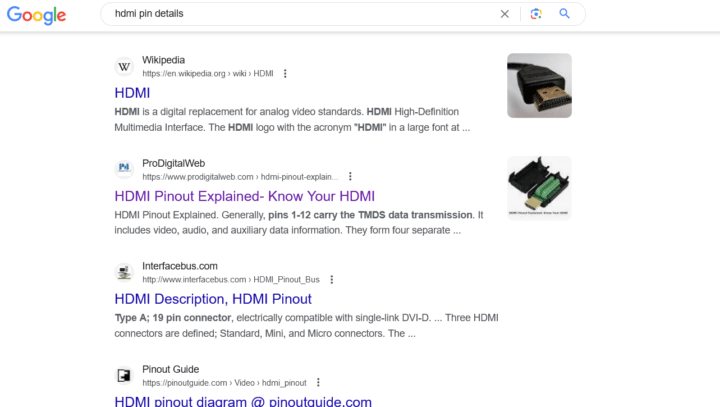There does not exist any entity that can dominate the biggest search engine space, quite like Google, in the wide ecosystem of the World Wide Web. Google serves as the principal gatekeeper of the web, while processing 8.5 billion searches regularly, along with maintaining a share of more than 90% of the global search engine market. Let’s dig into the article to learn “what is SERP API”, and more about it.
You can get a plethora of information on the web when you search with a single keyword. So, it is important to narrow down the search results to only those sites which are containing relevant information according to the search query. Every website developer wants to rank top at the search engine results pages or SERPs. Bing, Google, and other popular search engines continue improving their SEO bots & algorithms. So, it is essential to use SERP APIs for scraping data in terms of remaining relevant to the results of the web page.
What is SERP API?
SERP indicates those pages that are returned on the search engine once you type a keyword on the search bar. APIs indicate those software applications that let you scrape search results in real-time from the search engine. It runs on a particular programming language to make requests and give responses in a given format. The APIs let you review, analyze, track as well as improve the visibility of a website on the search engine.
Usually, these let you scrape SERP data in real time on any search engine domain. It indicates that you are able to gain insights into consumer trends & competitor activity, both paid and organic.
Search Signals
The journey of buyers usually starts with search engines, heavily dominated by Google. That’s why, in order to identify the changes in real-time, firms in the service providers & digital commerce industry are collecting Google search signals.
Suppose, your company is involved in a food delivery business to compete in a big city market. After the breakout of COVID-19 in 2020, the industry has exploded a lot and still got profits. Every business in the food industry can create multiple important data points like:
- images
- reviews
- locations
- prices
- special offers
You can find most of these on Google SERPs. Services that are willing to improve their products, along with gaining a competitive edge, should have all the updated restaurant data integrated into their database for optimization of their offerings depending on consumer trends. The amount of SERP data in a major city market is enormous and you should know that collecting all of it isn’t as simple as you think.
eCommerce is another relevant example. In this industry, companies need to keep on optimizing their products and improve SEO to appear on top of search engine result pages, along with attracting relevant and potential buyers who search for their product categories.
In this case, you need to collect data from Google SERP for organic & paid keywords. It requires diving into GEO-specific keywords and learning about ranking trends like Google shopping, Amazon/Bing product ads, etc.
How Do APIs Work?
Your first job is to generate an account with the SERP API you prefer. Then, you need to log in to the account. You should request an authorization key. With the help of the key, you are capable of making requests through the API.
Google SERP APIs let you extract information like paid results, organic results, featured snippets, etc, based on the endpoint request from SERP. These can also be used to search archives, check statistics on the number of searches, or the places that API supports in a fraction of a second.
Users:
In order to improve website visibility on SEO rank, webpage developers use these APIs. Search engine result pages are used by marketing teams to get insights into how their products are performing compared to other competitors. APIs are also used by local businesses that are willing to improve their business listing on search engines.
Expectations:
Clients can optimize content, and detect & fix website issues using APIs. They can also simplify the data collection process using APIs. Examples of some free SERP APIs are Whatsmyserp, SerpHouse, Apify, DataForSeo, Zernserp, and Serpstack.
Why Do You Need Google SERP API?
In order to extract search results, you should craft your Google web scraper with the help of the programming language you prefer. This approach is able to yield significant results for niche applications or smaller-scale operations.
A search engine API is essential to scale Google scraping. However, it can be risky when you use your Google web scraper, mainly while considering Google’s protective measures. If data is extracted on a large scale and rapidly, it will lead to an instant IP ban and halt the data pipeline. In order to ensure the longevity of your scraper, you need to alter the headers with every request, and it is a labor-intensive process.
If you seek a Google scraping service, it may happen that it is driven by the hardness of scraping Google as well as the requirement for quick access to data. If you don’t have an abundance of time, it is not advisable to develop a Google scraper.
Besides, data parsing is your responsibility, and it is not a simple task. Moreover, the biggest search engine — Google is evolving continuously, along with rendering scrapers ineffective over time. It is indefinitely an unappealing prospect to maintain a Google scraper.
Official API can be used from Google, but it is very costly. So, alternatively, you can use the unofficial Google scraping APIs, using which you are capable of getting Google search results anonymously. They can offer improved flexibility and are quicker in response.
Benefits of Google SERP APIs:
A good API scraping tool is able to provide more than search listings & ranking data. Google is able to offer plenty of services, such as:
- image search
- shopping search
- image reverse search
- trends, etc.
For example, data for image search APIs are capable of displaying thumbnails & original image URLs. As everything depends on JSON, it indicates that results can be downloaded quickly. After that, saving the images can be done as required.
Several businesses are willing to track the products of their competitors via Google’s shopping search. A Google Shopping API allows them to store prices, descriptions, etc. A real-time system can be used to automate pricing strategies.
-
Advanced API Features:
While an API overcomes the problems of changing proxies, it can include a few advanced features.
-
Location-Based Results:
When you use the correct API, you can get the search engine results based on the location. You need to choose the nation for the IP address. It indicates that you are able to see SERPs from Russia, Australia, the US, or somewhere else directly from the workstation.
-
Large Data Sets:
Whether the use case needs a big set of results, then an API will permit this. Besides, many endpoints can be set, and every query can be automated. For instance, a few APIs are available that enable you to send a lot of queries per day. No limit will be there.
-
Intelligent Parsers:
You know the issues of parsing scraped content already. It is very hard to extract your required data, but it becomes more when Google evolves. Intelligent Parsers are able to adapt to the changing DOM of search result pages. It indicates that the hard work is left to the API for making sense of information. You do not need to rewrite the code anymore. Hence, you should just wait for JSON results to keep yourself focused on your task.
SERP API SDKs:
Every SERP API is available & supported in multiple developer programming languages and SDKs. These are as follows:
Node.js
PHP
Python
Ruby
Objective-C
Java (Android)
C# (.NET)
cURL
You only need to choose your preference from any API endpoints page.
Why Is It Difficult To Extract Accurate Data At Scale From Google SERP?
Google – the biggest search engine never wants someone to crawl its results pages. So, it is quite funny to consider that it has made its information database with the help of crawler bots. And you must know that the bots feed data into the ranking algorithms of Google. These algorithms can decide the fate of small business and large enterprise websites.
Usually, Google SERPs remain loaded with sensitive bot detection depending on different indicators like information in the browser’s header, the number of requests sent from a single IP, etc.
It is quite difficult to face Google’s anti-bot mechanisms yourself. Triggering them results in a CAPTCHA halting your automated scraper. Additionally, it may be blocked when you try to scrape data continuously via the same IP address.
After the 2017 search update of Google, it is almost next to impossible to collect data manually. In this case, you have to:
- Sign out of Gmail accounts as well as Chrome profiles.
- Clear history and delete cookies.
- Change GEO-location through proxy or VPN to the nation you have targeted. Whether you use a browser extension, this biggest search engine might detect that you are using data center IPs.
- Open a browser window or a new tab for each new search. Then, you need to aggregate all extracted data.
In this case, the SERP APIs play an important role. It helps you to collect your required data into a structured dataset and you will not be blocked or forced to time your data collection manually and slowly.
How To Check SERP Manually?
Previously, it was simple to check SERP data manually. And it was very reliable also. But it is not the same anymore. Even you may not get proper results from this. The reason is that plenty of elements, such as your device, search history & location affect the method.
You are not capable of even depending on the incognito mode.
However, even if you get accurate results, you still need to do a lot of work manually. So, let’s learn how to use the SERP API.
Saves Time:
Suppose, you are spending half of your time doing things manually, and ending up not focusing on the vital aspects related to your business — that will be really terrible. With the help of the SERP API, you can save plenty of time, and it helps to reduce labor work.
Accurate Results:
It is difficult sometimes to check SERP manually. Several factors are available that need to be taken care of to ensure that you are getting the correct results. However, it’s not happening with SERP API, as you will receive the most accurate data every time.
No Rocket Science:
In order to use a SERP API, you don’t need any hardcore coding knowledge. Mostly, technical stuff is done by the source from which you will get the API. It makes sure that there isn’t any need to touch such “complicated” areas.
How Scraping SERPs Can Quickly Help You Uncover Damage Caused by a Hacker?
You must not want a hacker to pass through your security and tear down all the hard work you have done. SEO results that took several years to build up can be destroyed in just some days.
According to the reports, 48% of SEO professionals said that Google took months for the restoration of their original search results. The damage can be ranked from the earlier hacks to be severe more often than not.
In order to know what is happening with your ranking and how these can change during hacks, you can track the SERPs of your website. As a result, it becomes simpler to ask Google – the biggest search engine to reinstate your previous positions. According to a person, due to the downtime for eight hours, a 35% drop in SERP rankings was seen.
Generally, small businesses are vulnerable. Even most of the sites don’t know that they contain malware. Remember that malware damages the search results of any user and causes the person to be blacklisted. So, it is better to do a regular scrape off all your SERPs. Besides, you need to track the data to spot hacks and understand in which portion the damage is severe.
What To Consider While Choosing A SERP Scraping API?
Things that you need to consider before selecting SERP scraping API are as follows:
Response time:
These APIs strive to ensure 100% data delivery. They generally get success at this, outside of the highest-load periods. However, response time is an important factor to consider where the tools differ significantly. It relies on the proxy infrastructure, underlying web scraping capabilities, and many other aspects.
Location Options:
Usually, you need to verify that the service lets you target the nation you require. However, doing local SEO ensures that you are capable of picking a specific city or even co-ordinates.
Parser Quality & Variety:
SERP APIs are capable of downloading the search page and structuring the data for further use. These are not like general-purpose web scrapers. In most cases, people think paid & organic results are enough. However, you could get benefits from other search properties also. APIs follow various parsing schemas, among which a few could have improved structure compared to others.
Integration Methods:
SERP APIs are able to integrate in many ways, like as a proxy server or an API over open connection, using webhooks. It is important to consider which format is working best for you. Generally, large-scale operations prefer webhooks because they permit sending multiple requests asynchronously by saving resources.
Output formats:
Raw HTML or parsed JSON are the two most fundamental formats. A few tools support CSV output or directly send data to Google Sheets.
Accuracy And Reliability:
Despite scraping different types of data, it is necessary to go with a tool you can trust because of its reliability & accuracy.
Customization And Flexibility:
You need to choose a tool that comes with customization and your targeted flexibility options.
Price:
Every SERP API uses the same pricing model. Although APIs charge for successful requests, the cost might differ. If you want cheap services, they can cost less because they come with fewer features, and offer worse performance. Premium options usually sell for 1.5 to 2 times more at the beginning, and the more you scale up, it will gradually reduce the difference.
Language:
Like geolocation, it is important to draw attention to this factor to differentiate various SERP APIs.
Extra Features:
Most of the tools come with common features to access data. But it may happen that you will require additional functionalities to enhance your work.
The Bottom Line:
We hope that after going through this article, you have understood — ‘what is SERP API’. For researchers, businesses, as well as for individuals, this one can be a valuable tool. It is helpful for those who want to collect data on search trends, track changes in SERPs, and collect data on competitors. You can get many options to scrape Google SERPs, and it is crucial to consider the particular requirements of your project or business, along with evaluating features as well as the limitations of every service.
Frequently Asked Questions:
What does SERP stand for?
It stands for Search Engine Results Page.
Why Scrape Google?
Around 8.5 billion searches are processed by Google regularly. According to the reports, it has almost 93% market share in the search engine industry. So, we can say this is a gold mine of information. People use this data to build SEO tools, monitor competitors, reputation management, produce lead lists, and so on.
Is It Legal to Scrape Google Search Results?
It is legal to scrape Google search results because it falls into the realm of publicly available data. In order to prevent yourself from being blocked by Google’s anti-scraping mechanisms, you have to use web scraping solutions.







